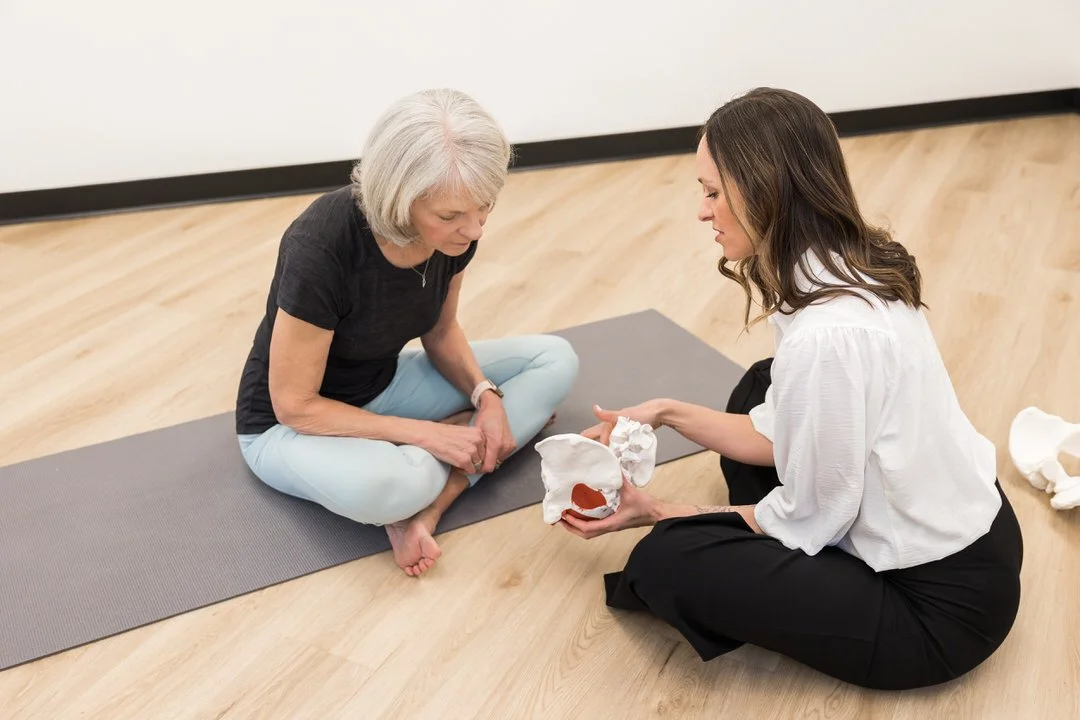Why Leaking Happens: A Guide from Your Southern Maine Pelvic Floor Physical Therapists
If you’ve ever leaked a little when you laugh, cough, or exercise, you’re not alone. Urinary leakage (also called urinary incontinence) affects millions of people, especially women after pregnancy, childbirth, or through midlife changes.
At Root To Rise Physical Therapy & Pelvic Health in Southern Maine, we see this every day and the good news is, there’s so much you can do to restore strength, control, and confidence.
What Is Urinary Leakage?
Urinary leakage happens when the pelvic floor muscles and the systems that support them (breath, core, and pressure management) aren’t working together effectively. It’s not always about weakness. Sometimes the pelvic floor is too active or tense and can’t relax when it needs to. Other times, the issue stems from how we breathe or manage pressure through the core during movement, or from an overstimulated nervous system that keeps the body in a state of tension.
When any part of this system is out of sync, the bladder can feel more pressure than it should leading to leaking during everyday activities like coughing, laughing, or exercise.
There are a few main types:
Stress incontinence: Leaking with coughing, sneezing, laughing, jumping, or running.
Urge incontinence: A sudden, strong urge to urinate followed by leaking.
Mixed incontinence: A combination of both.
Many people assume this is just part of aging or something they have to live with after having kids, but it’s not. These are signs of pelvic floor dysfunction and they can be treated successfully with the right approach.
Why It Happens
Your pelvic floor is connected to your core, breath, and posture. When one piece of that system is out of balance, your pelvic floor may not be able to do its job effectively.
Common causes include:
Pregnancy and childbirth
Hormonal changes during perimenopause or menopause
High-impact exercise or chronic straining
Poor breathing mechanics or posture habits
Core or hip weakness
Increased stress or nervous system tension
These factors can create either pelvic floor weakness (not enough support) or overactivity (too much tension). In both cases, leakage, pressure, or discomfort can result.
Why “Just Kegels” Often Aren’t Enough
While Kegels can be helpful, they aren’t a one-size-fits-all solution. Many people try doing Kegels without understanding how to coordinate the pelvic floor with their breath and movement - and in some cases, it can actually make symptoms worse.
At Root To Rise in Scarborough and Bath, we take a full-body approach to pelvic health. We assess your breathing, posture, movement patterns, and lifestyle to uncover the root cause of your symptoms and not just the surface level weakness.
How Pelvic Floor Physical Therapy Helps
Pelvic floor therapy is a gentle, individualized process that can include:
Assessment of pelvic floor muscle function and coordination
Breathing and core retraining
Manual therapy and myofascial release
Education on posture, movement, and bladder habits
Personalized exercise programs
Through this process, we help you retrain your body to move in balance again - so your pelvic floor can support you naturally throughout your daily life.
The Root To Rise Approach
We blend clinical expertise with mindful movement and holistic care. You’ll work one-on-one with a pelvic floor therapist in a supportive, private environment that’s focused entirely on you.
We help you:
Eliminate leaking, pain, or pressure
Rebuild confidence in your body
Return to running, hiking, lifting, or yoga without fear
Feel grounded, balanced, and strong from the inside out
For many clients, we also integrate acupuncture, mindfulness, and yoga-based movement to calm the nervous system and support whole-body healing, helping you refuel and restore energy for the life you love.
Whether you’re newly postpartum, navigating perimenopause, or simply tired of planning your day around bathroom access, we’re here to help you find relief and confidence again.
Ready to Take the First Step?
If you’re experiencing urinary leakage or pelvic floor weakness, you don’t have to accept it as your “new normal.” Healing starts with understanding your body and giving it the support it needs. Schedule a pelvic floor assessment at Root to Rise Physical Therapy & Pelvic Health in Scarborough or Bath, Maine, and discover what your body really needs to feel strong and supported.
Read More About Urinary Incontinence
Interested in learning more? Read another blog post we wrote about bladder health and urinary incontinence:

